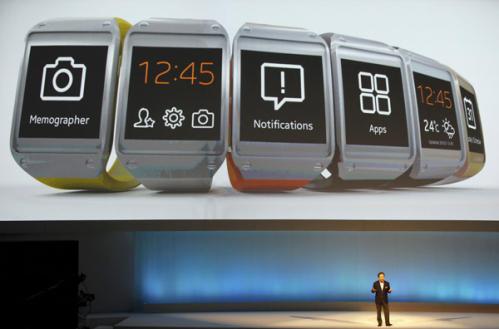
The Galaxy Gear, a wearable computing device from Samsung that looks like a digital wristwatch, is certain to pique much curiosity when it starts being worn in public. The intensely black rectangular screen and orange strap on the wrist of a Samsung executive immediately caught my eye as she entered a corporate meeting room to give a preview of the gadget.
Samsung will start shipping the $299 Gear smartwatch in September, ahead of a similar product expected from Apple. I had a chance to play with a pre-production unit for about 10 minutes and briefly with the version that Samsung announced Wednesday in Berlin on the eve of the annual IFA consumer electronics show.
Like similar products already being sold, the Gear is not an independent device. For useful functionality, the Gear needs to be linked with a specific Samsung smartphone or tablet computer. The pairing is done wirelessly over a Bluetooth connection built-in to both sides.
The Gear's display is a touch screen measuring 1.63 inches diagonally. Its strap has an embedded camera. The Gear supports apps such as Facebook and lets the wearer answer incoming calls or check email without picking up the smartphone that's paired with it. The Gear is not the smartwatch disclosed in recent Samsung patent filings with a flexible display.
With smartphones and tablets now ubiquitous, the mobile phone industry is creating a new category of products to wow consumers. Many believe the next big step for consumer electronics is advanced computing technology in everyday objects such as wristwatches and glasses.
Sony introduced its latest SmartWatch in June and unveiled an update Wednesday. Google is working on Google Glass _ a device designed to work like a smartphone and worn like a pair of glasses. Apple is seeking an iWatch trademark. Meanwhile, the response to projects such as Pebble, a smartwatch that received more than $10 million in investment pledges through funding website Kickstarter, also attests to the public interest in this trend.
It didn't take me long to see what Samsung is trying to achieve. It wants to attract not only tech addicts who must have the latest gadget but also young, design-conscious consumers. The Gear's design flair and ease of use are its sweetest attributes, but it may not entirely please either group. Although powered by the Android operating system, like many phones and tablets, it will work only with Samsung devices _ and only with newer models.
At about twice the price of the Sony SmartWatch and the Pebble, Gear boasts a camera, a speakerphone and plenty of apps _ about six dozen, according to Samsung. Apps include Twitter and sports services such as RunKeeper, which tracks runs and other workouts. These are all great features, but the 1.9 megapixel camera is of poorer quality than a typical smartphone camera. In addition, moderate use of the device will require a daily battery top-up with yet another charger to keep track of.
I can imagine wearing the Gear with a casual dress or a formal outfit. It is sleek, with a thin metallic bezel surrounding the display. The strap comes in six different colors. But the screen, which is pitch black in idle mode, probably draws more attention than a tasteful accessory should. The dark recess in the strap where the camera's lens is embedded will also elicit questions from the curious.
In terms of what the Gear can do, the three features I tested worked efficiently. It was easy to activate the camera and quick to shoot a photo. It left both hands free while placing and answering calls. The Gear alerted me with a nice soft buzz and showed a preview of a newly arrived email. The full message can also be read.